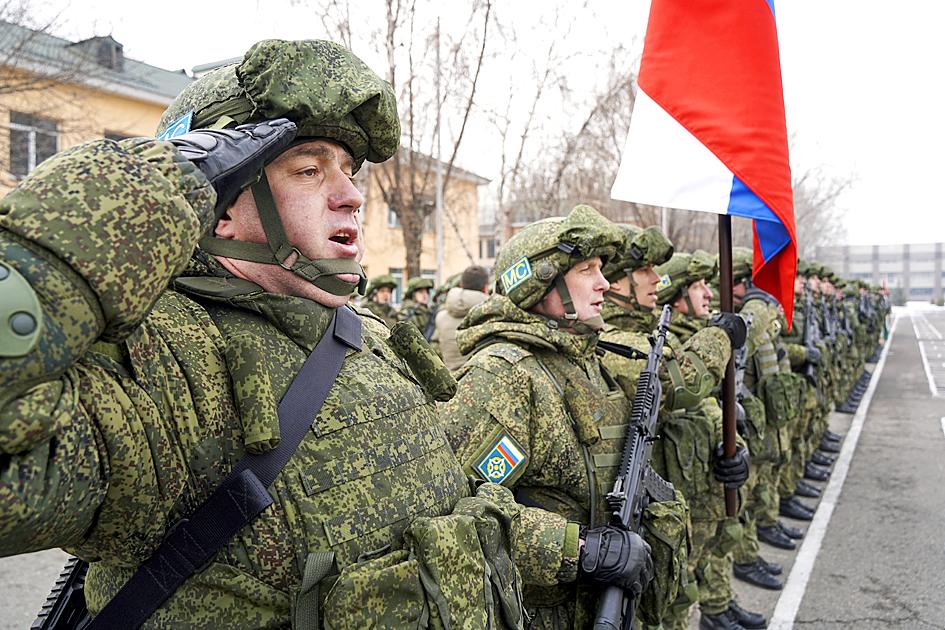More than 2,000 Russia-led troops yesterday began withdrawing from Kazakhstan after being deployed when peaceful protests over an energy price hike turned into unprecedented violence claiming dozens of lives.
The decision to dispatch peacekeepers was a first for the Moscow-led Collective Security Treaty Organization (CSTO), often touted by Russia as a NATO equivalent, but previously reluctant to interfere in unrest in central Asia — a region with long historical ties to Russia.
At a ceremony marking the end of the CSTO mission, soldiers lined up as anthems from each of the six CSTO member countries were played before official speeches began.

Photo: AP
“The peacekeeping operation is over ... the tasks have been fulfilled,” said Russian General Andrei Serdyukov, commander of the CSTO contingent that saw troops from Russia, Belarus, Armenia, Tajikistan and Kyrgyzstan sent to the former Soviet republic on Jan. 6.
The “collective peacekeeping forces ... are starting to prepare equipment and materiel for loading into the planes of the military transport aviation of the Russian aerospace forces and returning to the points of permanent deployment,” the Russian Ministry of Defense said.
Kazakh President Kassym-Jomart Tokayev on Wednesday said that Russian and allied forces “played a very important role in terms of stabilizing the situation in the country” during his first visit to the country’s main city, Almaty.
The financial hub of 1.8 million people was devastated during clashes between security forces and government opponents that gave way to a spree of looting.
“Without a doubt, it was of great psychological importance in repelling the aggression of terrorists and bandits. The mission can be considered very successful,” Tokayev added.
One of the strategic buildings that the CSTO contingent was guarding was Almaty airport, which was reportedly seized by government opponents last week.
The airport’s press service said that it was handling both domestic and international flights again yesterday.
Agence France-Presse correspondents earlier yesterday witnessed a funeral for a serviceman killed during the clashes which was attended by dozens of soldiers and featured somber military music. Tokayev has framed the clashes as a coup attempt assisted by local and international terrorists.
Russian counterpart Vladimir Putin hinted that the violence was reminiscent of “color revolutions” instigated by foreign meddling.
Those narratives resonated with some residents of Almaty, despite the lack of proof provided by authorities.
Retired engineer Malik Shai-mukhambetov blamed the shoot-outs in his city on “foreign aggression,” which he said had subverted state troops and allowed gangs to seize government buildings.
“I see these events as a kind of orange revolution provoked by the west,” Shaimukhambetov said, referring to political protests that erupted in Ukraine in 2004.
Tokayev said the phased withdrawal of the foreign troops would take no more than 10 days.

South Korea would soon no longer be one of the few countries where Google Maps does not work properly, after its security-conscious government reversed a two-decade stance to approve the export of high-precision map data to overseas servers. The approval was made “on the condition that strict security requirements are met,” the South Korean Ministry of Land, Infrastructure and Transport said. Those conditions include blurring military and other sensitive security-related facilities, as well as restricting longitude and latitude coordinates for South Korean territory on products such as Google Maps and Google Earth, it said. The decision is expected to hurt Naver and Kakao

MONEY GRAB: People were rushing to collect bills scattered on the ground after the plane transporting money crashed, which an official said hindered rescue efforts A cargo plane carrying money on Friday crashed near Bolivia’s capital, damaging about a dozen vehicles on highway, scattering bills on the ground and leaving at least 15 people dead and others injured, an official said. Bolivian Minister of Defense Marcelo Salinas said the Hercules C-130 plane was transporting newly printed Bolivian currency when it “landed and veered off the runway” at an airport in El Alto, a city adjacent to La Paz, before ending up in a nearby field. Firefighters managed to put out the flames that engulfed the aircraft. Fire chief Pavel Tovar said at least 15 people died, but

THE TRAGEDY OF PUNCH: Footage of the seven-month-old Japanese macaque has gone viral online after he was rejected by his mother and formed a bond with a soft toy A baby monkey in Japan has captured hearts around the world after videos of him being bullied by other monkeys and rejected by his mother went viral last week. Punch, a Japanese macaque, was born in July last year at Ichikawa City Zoo. He has drawn international attention after zookeepers gave him a stuffed orangutan toy after he was abandoned by his mother. Without maternal guidance to help him integrate, Punch has turned to the toy for comfort. He has been filmed multiple times being dragged and chased by older Japanese macaques inside the enclosure. Early clips showed him wandering alone with

Australian Prime Minister Anthony Albanese yesterday said he did not take his security for granted, after he was evacuated from his residence for several hours following a bomb threat sent to a Chinese dance group. Albanese was evacuated from his Canberra residence late on Tuesday following the threat, and returned a few hours later after nothing suspicious was found. The bomb scare was among several e-mails threatening Albanese sent to a representative of Shen Yun, a classical Chinese dance troupe banned in China that is due to perform in Australia this month, a spokesperson for the group said in a statement. The e-mail